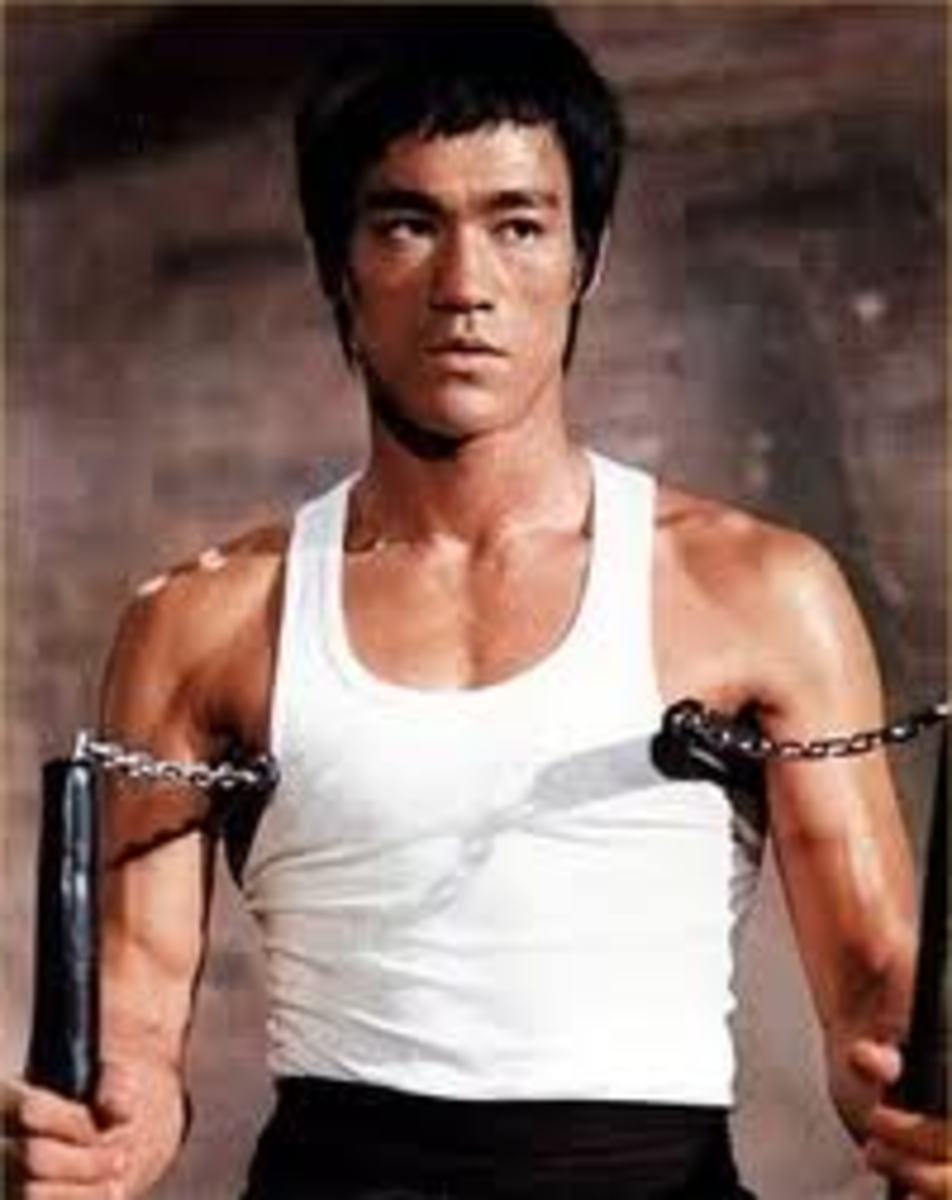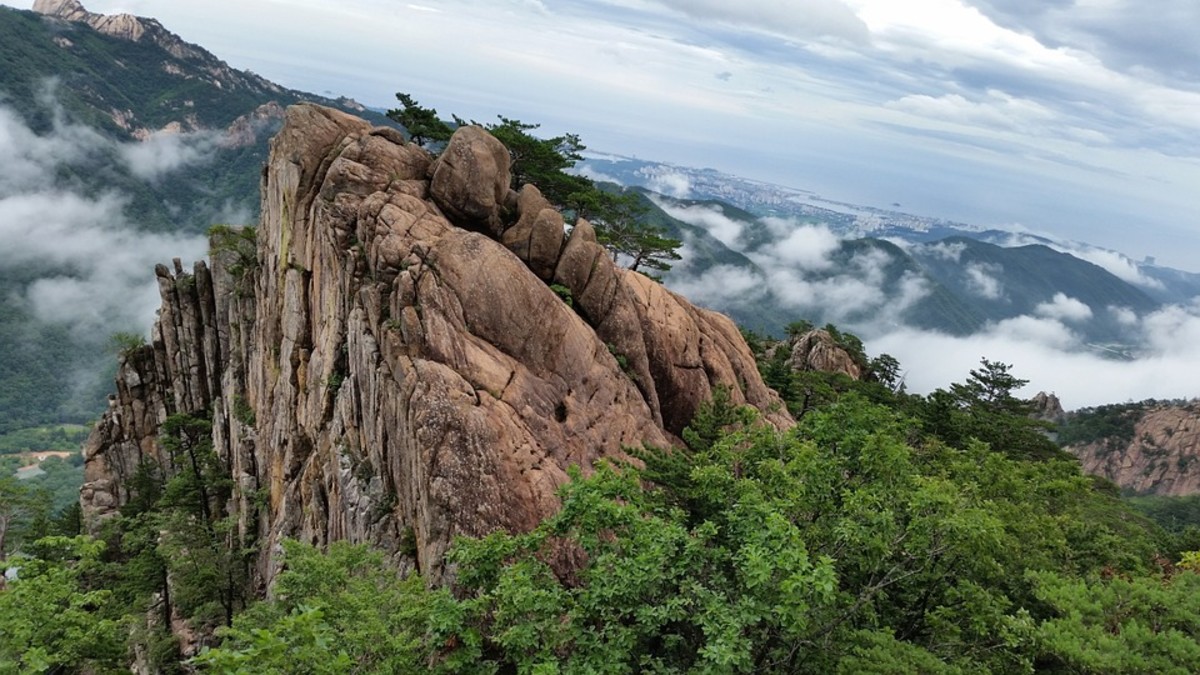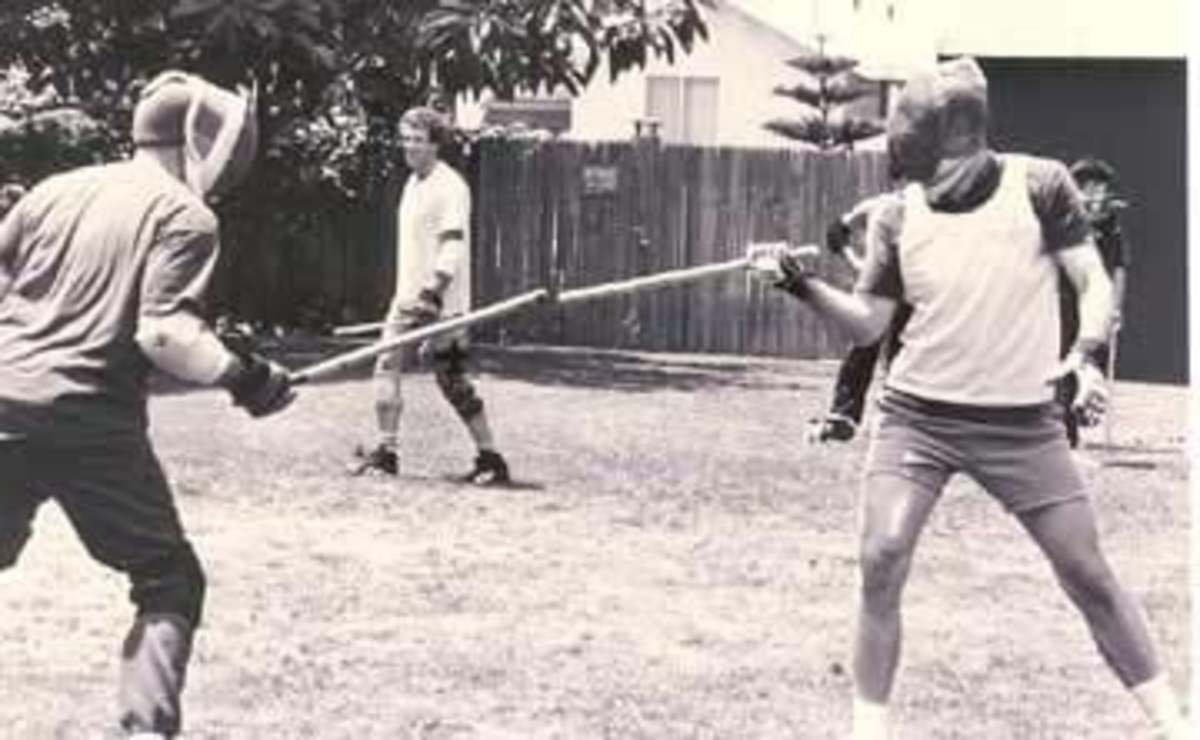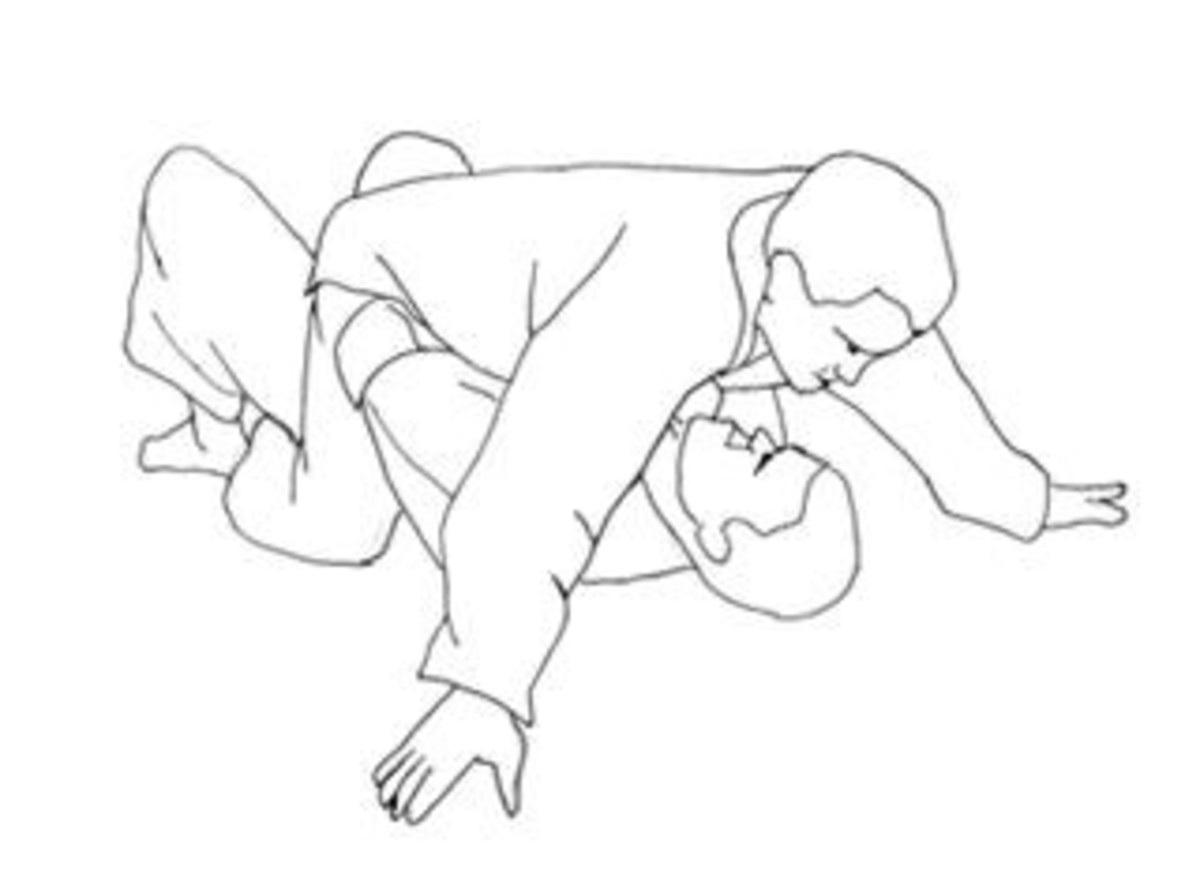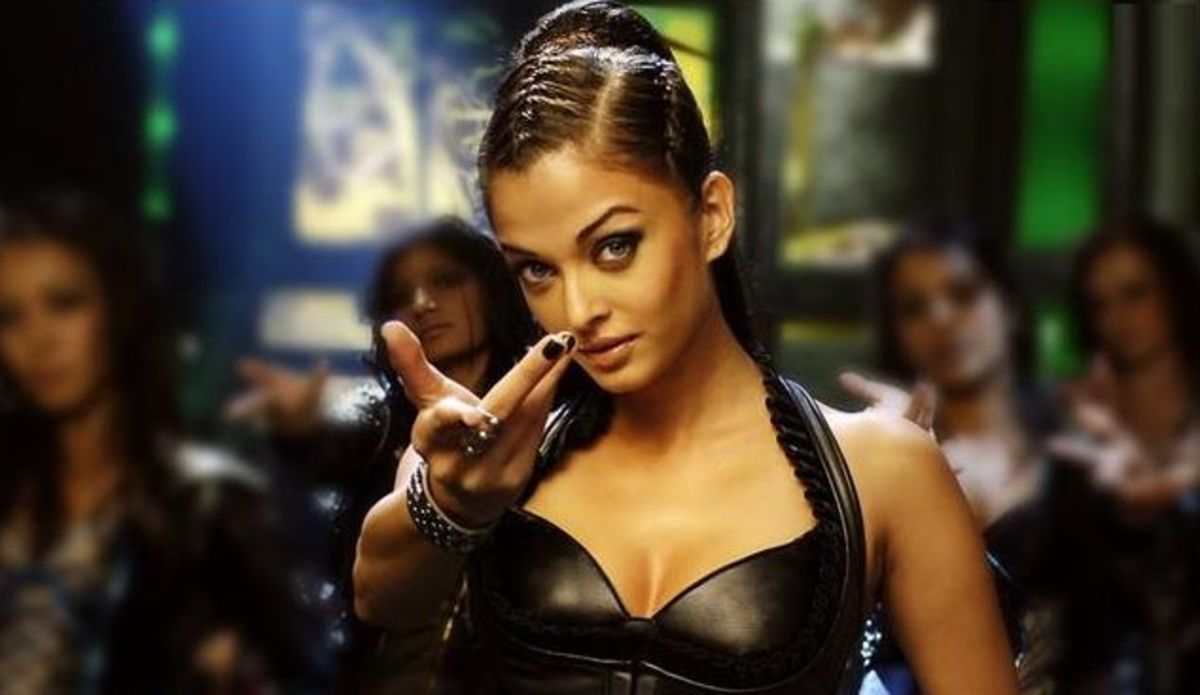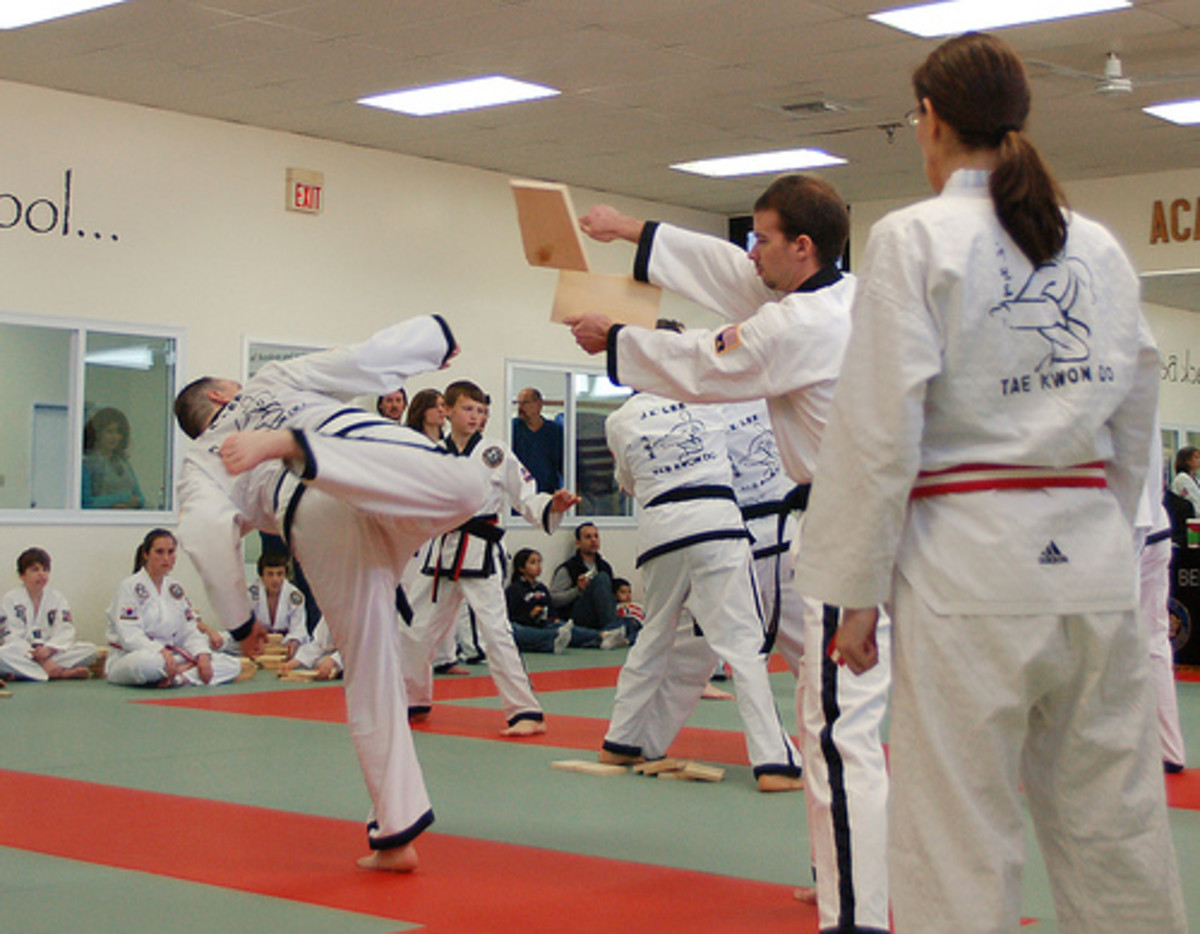Civilian Preservation Technologies - An Interview
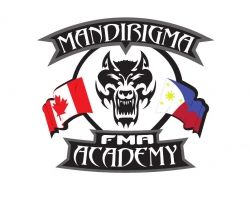
Mandirigma Filipino Martial Arts Acadamy
I first began training in martial arts with Karate classes while in high school. I didn't really think much about which martial arts to study - or even what styles there were - simply because there was no other option available where I lived at the time.
My own training was set aside as years passed, until I had daughters. My husband began to train and eventually teach, and for a while we taught women's self defense classes together. In time I developed my own personal philosophy of self defense that I've passed on to my daughters; when confronted with a situation you can't get out of, do maximum damage with minimum effort, then GET THE [insert bad word here] OUT!
It's not the most elegant of philosophies, and a touch crude, perhaps, but when it comes to self defense, my views tend more towards pragmatism.
Today, there are so many styles and schools available, it's hard to know what to look for! It has been our honour to meet some fantastic people through martial arts training. One of them is the ever awesome Darren Friesen, who now runs his own martial arts acadamy in Costa Rica. He was kind enough to indulge me in the following interview. If you are interested in martial arts training, self defense, or just curious, I know you will learn a lot from him. You can visit his site and tumblr pages at Civilian Preservation Technologies - Mandirigma Filipino Martial Arts Acadamy web site and blog.
All images on this page are used with permission from, and belong to, Civilian Preservation Technologies/Mandirigma FMA Academy.
Updated with testimonials and video: Feb. 23, 2012.
Updated with radio interview: July 16, 2013.
What's your opinion? - Tell us what you think now, then answer the poll at the bottom to follow up.
Are you interested in martial arts?
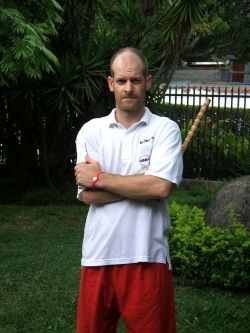
Let's start with learning a bit about you. Where are you from, and how did you get involved in the martial arts?
I was born in Thunder Bay, Ontario, Canada but I grew up in a little town named Morris that's about 30 minutes south of Winnipeg, Manitoba. Quiet town with little to do but get in trouble and drink or leave to make your mark. I was always very blessed to have wonderful parents that had immeasurable patience and put up with a lot. My dad always taught me a lot about defending myself; the way he carried himself, his actions, his personal experiences with real violence, body language, dealing with other people, etc. He's always demanded respect without playing the role. I have a beautiful wife, 2 fantastic boys that I'm proud of and love both roles. I've been living in Costa Rica for a little over a year now. I have always had an affinity for the martial arts, though. The movements, the grace, the body control, the mental aspect. For some reason they always caught my eye; rarely the flash but the functionality, redirecting body mass and manipulating joints..fascinated from about 12.
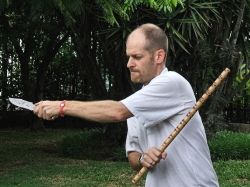
"Darren is one of my top students and instructors. I feel strongly about his expertise and skill in Filipino Martial Arts (FMA) and he has been certified to instruct in the FMA styles of Burokil Alambra Arnis De Mano and Tungkong Bato. Through his rigorous training and continued self-study, he has developed into one of the strongest Buno practitioners I have met. Darren is a highly skilled instructor in both FMA and street self-defense."
Hari Dante Solomon Alambra
Hari Burokil Alambra Arnis De Mano
Father and Founder of Modern Sikaran
10th Degree Black Belt Tungkong Bato
9th Degree Black Belt Sikaran (WSB/WSO)
What does Mandirigma mean, and what is the proper pronunciation?
Actually, I have recently changed my official name to reflect more what I teach although I use both names depending on the group type that I'm marketing to. Civilian Preservation Technologies represents my views on modern personal preservation with a constantly-evolving curriculum that never becomes staid. Like every other business arena, combatives and personal defence should be no different in their ability to change with the times. Mandirigma (man-de-rig-ma) means warrior in Tagalog, but I feel that word has become somewhat perverted in the last few years. People use it to describe prize fighters, bar fighters, jacked-up pro football players and the like. Tough? Without a doubt. To me (for those of you about to get hostile, I stress the "to me") it has always meant one who is capable of great violence but chooses the high road, knowing what using and receiving violence does permanently to a person's mental makeup and psychology. I've always liked the term "warrior poets" I heard in a movie once, as it shows capability but civility and restraint as well. Always having other options to exhaust first.
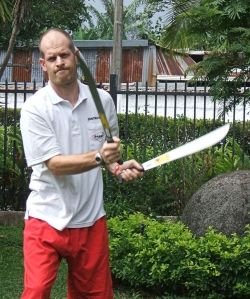
What styles of martial arts have you studied, and to what extent?
I have studied many briefly, some substantially more seriously. I have dabbled in Kung Fu, Kempo Karate, Hapkido, Ninjutsu, Jiujitsu,Boxing and fencing. I have teaching ranks in Chi Kung, Shootwrestling, cane self-defence and sword combatives, as you know. ;-) But I fell in love the minute I started with the Filipino martial arts. The flow, sensitivity, speed just fit perfectly with both my body movement and my genes. I come from a family with a history of fast reflexes and reactionary skill so it was a perfect match. I have a 4th degree black belt and “datu” ranking (chieftain of own tribe) in Burokil arnis de mano under Hari Dante Alambra, subsystems Dumog/Combat Judo (close quarters combat), Panantukan (dirty Filipino boxing) and Panandyakan (low practical kicking) and have developed my own system (called Terra Firma FMA Concepts) after years of and with help from training with Canadian military, law enforcement personnel and experienced open minded martial arts veterans. It’s more of a conceptual, reality-based program designed for real-world modern problems which I’m very proud of.
What led you to specialize in Filipino Martial Arts?
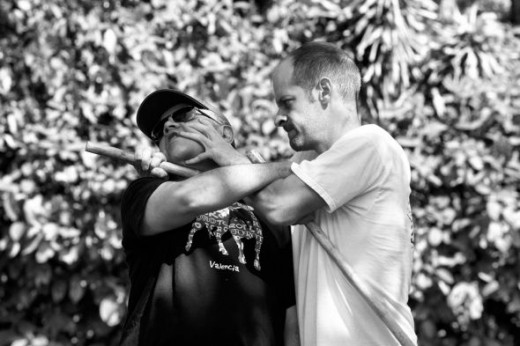
The pragmatism. Quite simply, they're the only thing I've come across that puts a weapon in your hand immediately with no politics and no mysticism. They just look for the fastest way to debilitate an attacker. The culture they come from is a bladed one and comes from more of a European lineage than all other eastern Asian martial arts. With Spanish, Dutch and Portuguese occupation at various points in their history, their systems have evolved with more of a circular learning curve where they have innumerable areas of study "on the wheel" that all inter-relate to one another instead of a progression of time. "For your yellow belt test you'll have so-and-so knowledge and when we get to orange we'll start you on this," has never applied. Everything connects and is transferable, to an large extent. Which leads to another distinction - until recently (read: arrival in North America where many seem to have the perpetual need for false achievement honor) belts were just not a part of Filipino martial arts history. The only reflection of so-called rank was your ability to defend yourself practically, which is inevitably the focal reason people start martial arts. (I know there will be those who have varying reasons but that is the one that draws someone to the martial arts, as opposed to cardio kickboxing or yoga, for instance) They are also target, reaction and attribute-based, which means they help develop specific attributes in that particular person and attacking the target instead of the "one size fits all" idea of sequenced and static responses - which is why so many FMA specialists look like they're "winging it" as scripted responses are often very foreign to us.
The Filipino martial arts are also much more tribal in nature than martial or militaristic. They were traditionally handed down from within the family, not through a hierarchy of eliticism which is prevalent in many other eastern Asian martial arts. I like the idea of promoting the Western arts generally as they get so little coverage in the grand scheme of things, almost a lost artifact in my world. We, as North Americans, Europeans, Latinos..have a great history of combative arts lore that gets lost in the popularity of the arts of Japan, Korea and China. (Full marks to them as they've got the marketing schematic down pat! Lol) Lately, I've been studying the "fight books" from such marvelous sites as www.thearma.com and www.aemma.org that go as far back as the 14th century - easily the earliest authenticated and documented curriculums that include photos and structure that exist. Fascinating stuff and clearly the forerunner for much of what is out there today: the Filipino martial arts, modern fencing, western grappling along the catch-as-catch-can wrestling and shootwrestling lines, Spanish knifefighting, etc.
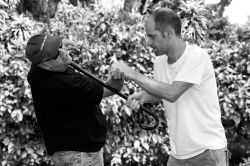
"I was quietly training at my brother's martial arts club here in Winnipeg, some years ago when someone walked in together with a friend asking about our style of martial arts. After a short conversation this guy and his friend asked if they could try a class. They did and as they say the rest is history. The guy that walked in stayed not only to learn our style but ended up helping us in all aspects of our Filipino martial arts training. The name of the guy that walked in, is Datu Darren.
Darren and I ended up training together, but for some reason his progression in Filipino martial arts skyrocketed and mine not so much. He trained with other matrial arts to try to cover all the bases, from standup to the ground and even weaponry. But as he will tell you himself, he really fell in love with FMA. Datu Darren is tireless in his search of ways to even improve his already impressive repertoire of FMA.
Training with Datu Darren will improve your current style or if you are searching for a practical no BS method of self defense. I highly recommend to anybody to learn from Datu Darren. Although i was already in martial arts before i met Datu Darren, the practical self-defense that he shared is something new to me. If there is anybody out there searching for a martials arts to learn,or wanting real life skill, environmental awareness, straight-to-the-point self-defense, look no further, Datu Darren is the one you are looking for."
S. Carlo S. Alambra
teacher, student, training-partner
2-time World Sikaran Champion
I notice on your website you stress things like functional, practical and reality-based martial arts.
The list of styles and weapons you've trained in is substantial. You've also eliminated belt grading systems and describe your school as "family friendly." The combination is unusual. What is your philosophy towards martial arts, and how did it evolve?
My philosophy has admittedly changed drastically over the years. As I gained more experience I realized that most were just practicing the physical which, make no mistake, is hugely important but only a portion of the matrix in total. Many don't address situational awareness, things like autogenic/combat breathing, submissive postures, verbal dissuasion, biomechanical attacks, the law, lethal vs. non-lethal, the difference between gross-motor and fine-motor skills, tachypsychia and adrenal dump - the list goes on. The majority don't factor these elements in to their curriculum and all of these change greatly the way we train and what we can achieve In reality. People think they can change thousands of years of human evolution but I'm afraid it just isn't so. Are there exceptions of excellence to the rule? Sure, of course. But I'm talking about what you can teach to the average person; the housewife, the awkward adolescent, the business man/woman who doesn't have 8 hours a week to train, the aging senior. They aren't just "unlikely" to pull off some moves, it is completely unachievable in many regards. I teach the physical, metaphysical or mental, the situational and the behavioural - the whole sphere.
Terms like "reality-based self-defence", "personal preservation" (which I like the best for me as neuro-linguistically it doesn't infer "defence"), "personal defence" are admittedly catch phrases to separate themselves from the stereotypical colored belts, trophies, tournaments, gis, child-friendly environment that people have begun to associate with the arts. It's become more art than martial on many fronts. I believe I can maintain the family-friendly atmosphere with my programs both with my style of teaching and with the idea that there's a huge untapped demographic out there that wants to be safe without rolling around on the ground or punching each other for 3 hours a night or going through the process of belts and protocol. MMA is not the sole truth of combat and many are looking for a more cerebral and all-encompassing outlet to feel safe. I call it cerebral self-defence as your mind is always your greatest tool. I've always loved the idea of the cerebral warrior. Doing battle with our brain should always be the first avenue, Lord willing. At the end of the day successful personal preservation should still be avoiding violence entirely, not lamenting the "fight that got away."
Weapons are also a great tool that serve as a force multiplier. That is the truth. I hear time and again how "Ohh, I just don't think that I could ever use a weapon on another human being" but the truth is that elements like weapons, multiple attackers and an unforgiving surface are now the rule, not the exception. And I've found that if you put the scenario in the right context, the opinion tends to change. Here in Costa Rica the methods of modern violence are even more pronounced in that regard. Pulling guard and going for the vaunted triangle choke isn't going to help you against the guy with the hidden knife or his buddies that suddenly appear and I can assure you that everything hurts a lot more on asphalt or concrete. In fact, it could very well get you killed. (Which is not a knock on grappling as in it's element and the skills it gives are exceptional, only that it's not appropriate for many street scenarios)
You mentioned the mind. How important do you think mental training is?
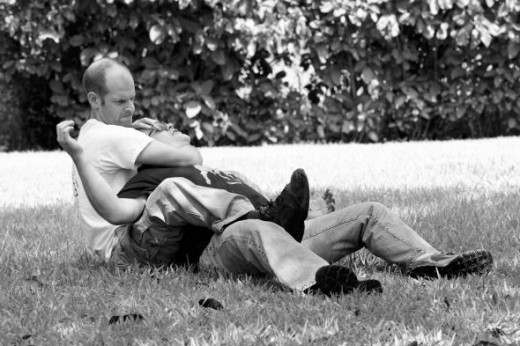
"After the very first training session with Guro Darren Friesen I came to the conclusion that there were some serious gaps in my Jiu-Jitsu training. What a hit to the ego on what you think you know versus what you really know. As a military close quarter combat instructor and long time martial artist I immediately realized that this was someone that had complete dedication and insight to reality based hand held weapons combat. I still use Darren's curriculum in my own club". I invite anyone to contact me with any questions or to verify this testimonial."
Ole Frederiksen
Sergeant in Canadian military with multiple tours of duty
Club owner at Martial Arts Nanaimo
Nanaimo, British Columbia, Canada
Huge. I see full value in things like meditation, chi kung, yoga and other breath or internal arts and in so many areas. The offshoots of their effect will always be felt far more and with more regularity in your daily life. The fight you avoided with your significant other. The extra patience shown with the munchkins. The stoic calm during a job interview. But it has a significant impact on your physiological system during a violent encounter as well. Without getting too overtly detailed, breath and - to the extent that it can be - heartrate control are imperative to accessing your skillsets, to being able to verbally de-escalate situations and learning how to deal with adrenaline dump (often referred to as tachypsychia). The best way to deal with violence is still to avoid it, no? Pride be damned, my goal at the end of a successful day is to make it home to my wife and kids in one piece and there are a variety of other skills that can be used to achieve this before physical aggression is needed, all triggered by the metaphysical realm.
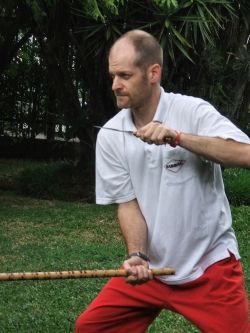
You're a long way from where you started!
Looking back, what are the fine threads that lead you to where you are today; a Canadian with a martial arts school in Costa Rica?
I am indeed! Sometimes I still awe at the cycle of life and look around and wonder how I ended up here. Lol. I married a "Tica", a Costa Rican woman with a great internal strength and intensity. Falling in love takes you a lot of places where you never thought you'd land! As for the school, it has initially been a tough sell as it seems to be a little ahead of it's time here; reality-based systems/personal preservation and weapons arts have not yet found a place in the mainstream. Costa Rica usually seems to be a few years behind the U.S. and Canada in terms of adopting cutting-edge methods in specialized areas. It's coming, though, and with the ever-increasing need of safety here I feel it's just a matter of time. Patience, grasshopper! I'm hoping to be at the forefront of the movement for both. I read in an article that personal safety has replaced economic stresses as the number one worry in the minds of just under 50% of all Costa Ricans so that's a powerful indicator of the changing tide, and I'll be here waiting patiently.
What would you say to someone who is interested in studying martial arts? What would you tell them to look for?
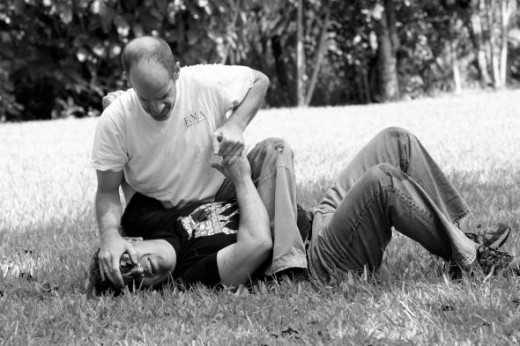
I would tell them to seek out someone who's authenticity shows. What I mean is, someone who's honest, adaptable and open to change, who isn't afraid to fail and make mistakes and who's in touch with real-world common sense. Far too often the leaders in the field have a need to look almost indestructible or untouchable, which should raise alarm in the student. That's an ego trip. I have always believed that it's far more humbling to me as an instructor and achievable for the student when the instructor shows flaws and is honest - both about the pros and cons of techniques and tactics - then feeds them some line about how "it's been this way for 500 years and 6 generations previous so who are YOU to ask questions?!!") This is a service industry like any other and the consumer has a right to ask questions and question period ESPECIALLY as it pertains to his or her personal safety. Everybody has to develop their own personal repertoire of techniques, concepts and tactics that fit their mind, frame, attributes, etc. Yours is different from mine and vice versa and yet we continually try and create a bunch of robots that all move and react the same way. It's just not possible and yet many instructors still try and fit a round peg in a square hole.
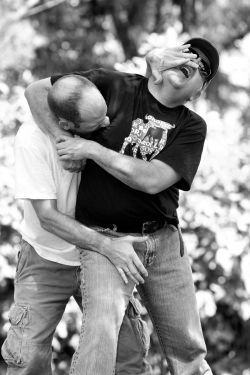
"Darren began his training in Filipino Martial Arts under my father in our family style. Over the past 15 years Darren's pursuit of knowledge in personal safety as well as combat effectiveness has not only included training in many other forms of martial arts, but also countless hours of research on anatomy, psychology, sociology and criminology. Darren has an uncanny ability to absorb this information and blend it into his own style of personal self-defense that not only gives the practitioner the ability to protect themselves physically, but also teaches the individual how to assess situations and avoid confrontation. What separates Guro Darren from other self-defense instructors is that he not only teaches the nuances of physical, social and environmental aspects of self-defense, he also includes the legal aspects in his training. If your looking for the real deal, look no further!"
Dastin Alambra
Head Instructor
Sikaran Arnis School of Martial Arts
Tagapagmana nang Pamamaraang Alambra (Heir to the Alambra Style of Martial Arts)
Unang-Batikan Burokil Alambra Arnis De Mano
9th degree Modern Sikaran
6th degree World Sikaran Arnis Brotherhood
www.sikaranarnis.net
What would you say to someone who thinks they don't need to study martial arts at all?
I'd say it's a personal choice, but the journey is worth it if you find your niche(s). I think many people have developed negativity towards traditional martial arts as they're becoming tired of the gimmick. The mysticism. The politics. The master-servant relationship. This stuff just doesn't fly in the western world anymore. People want to sift through the mystery and get to the nitty-gritty; "How can I feel safer and protect myself in an ever-increasingly dangerous world?" I have to admit, although it's not my thing, that MMA (mixed martial arts) has forced some change in that regard; hard work, trial and error, a visceralness to technique, range awareness (ground, standup, clinch, striking skills, etc.). The thing I don't like is that it doesn't often address to the average person what happens in an attack on the street (back to weapons, surface, multiples, interviewing, etc.) and many exponents have seeming self-control issues with regards to "cockfighting" or fighting for the sake of fighting. (Admittedly, the few may be giving the many a bad name)
All in all, though, many of the skills you learn in the arts are transferable to life, not just self-defence. I have learned how to breathe to restore relaxation and control my wits. Defensive driving. First-aid. Reading body language in others. Cultivating intuition. Spirituality. Meditation. The importance of words. All things that pertain directly to daily occurrences in one's life even if one never has to use life-saving physical self-defence skills and learned either directly or as an offshoot of the martial arts world. The cumulative effect of many of these life skills can give you great advantages in your business life, social life, personal life, spiritual life, the benefits are far more wide-ranging than the average outside onlooker can see on the surface.
What are the most common misconceptions and problems you encounter from people looking into martial arts? - How do you think those misconceptions develop?
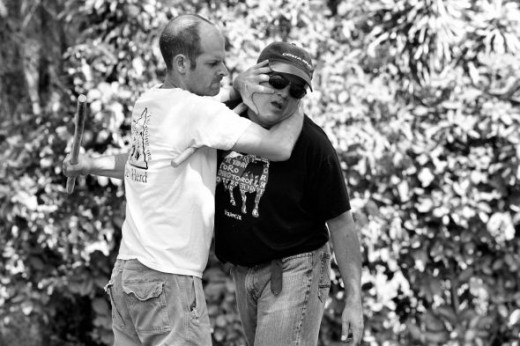
I think this ties into some of the responses I've already given, that martial arts represents a little Eastern-Asian elderly man with a gi and a long moustache with mystical powers, similar to Pai Mei in the Kill Bill movies. LOL We've come a long way since World War 2's ending, where many serviceman stayed overseas to learn judo and karate and subsequently brought it to North America and, inevitably, the world shortly thereafter. Many still view modern instructors in one of two ways; the Pai Mei view or that we're archaic Neanderthals that just create chaos for the sake of creating chaos. I, for one, am neither and a long way from both. Many are very grounded, articulate and intelligent individuals that are just as evolved and comprehensive in their specialties as anyone else in other fields of specialization in the business world. We are human. Bullets, knives and punches can hurt us just like they hurt anyone else. Can and do.
As to how they develop? Well, I think a lot of instructors propagate those myths themselves, which (at least to me) is a detriment to moving our field into the 21st century. This is no longer 16th century Japan, for instance, and the things that people got away with then will land one in jail, broke from legal fees, and with father/motherless children now. It's a different world and that's why I love the phrase we use "modern solutions for modern problems" at the club. Very applicable and it separates us from the stereotype status-quo.
I think another thing is that people tend to believe that they're at risk of injury in a martial arts class, which there's less of a risk in this arena than in your standard basketball or baseball game. There is always a personal sacrifice to reach a certain level of efficiency in anything you do but the sacrifice is always worth it and personal safety is not easy. If it was, we'd all frankly be safe and there'd be no need for these types of programs. Facing your fears is enlightening and transfers to so many other areas in one's life. The benefits are transforming and it's important to deal with them in a controlled environment for preparation of reality… you don't learn how to swim by watching Baywatch. (I smell a new t-shirt slogan)
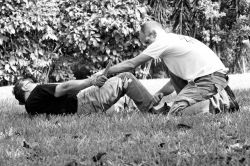
What can people interested in your school expect to find, learn and experience?
No ego. Cultivation of learning. Evolution to fit changing needs. I have never been much good teaching the "fighter" but have found much more of a niche teaching the "survivalist" or "everyman/woman." I am a perpetual student and the final authority on nothing. I am learning all of the time just as much as the student and the truth is more important to me at this point than anything. I teach nothing that I myself wouldn't use to defend my family with. If people think that that represents abandoning the past so be it, but I believe I'm making functional and modern the exact same foundations of the past - I'm just not so specifically loyal to ghosts of generations past.
People can find a tribe that works with each other to help prepare themselves and each other for the dangers of modern violence. We're not fighting each other. This is not a competition, everybody learns at their own pace and takes something from every class. Some classes are physical, some are classroom and discussion, some are scenario-driven. I always keep it interesting and fresh and a positive atmosphere for learning is imperative to me. I love a relaxed environment surrounded by creative people eager to learn and lead. Things evolve quickly in this way. Egos get checked at the door.
What do you see in the future for martial arts in general, and Filipino martial arts in particular? Why?
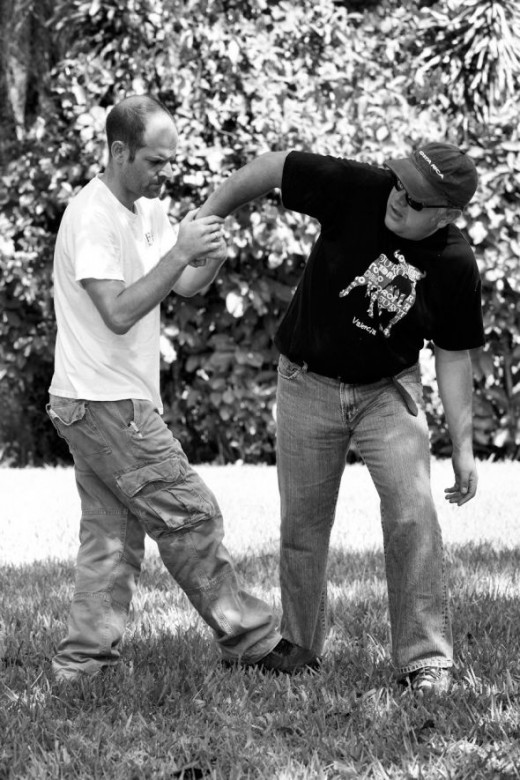
I think there will always be a place from here on in for the traditional arts, mixed martial arts and reality-based self-defence. They all have their niche and will continue along their own trajectories. Which one will surge ahead, if any, is anyone's guess. I think the latter two have a better chance for longterm survival because, as I mentioned, people get tired of jumping through hoops and dealing with politics in their extra-curricular time - they get enough of it during their regular workday. I think regardless of which of the three you believe in (or combination thereof) I think people will gravitate towards those instructors that teach truth, have humility and avoid the "grandmaster" this and "master" that relationship and evolve into more of a coach/player relationship with their students.
I think social media has definitely changed the landscape as well with regards to everything now being on the table. There are no more secrets. No more hidden devastating moves. The world is a much smaller place and the ability to corroborate with other specialists in your field and have brainstorming sessions has propelled the creativity and advancement of conceptual ideas to a learning level that hasn't been seen likely in the history of martial arts. The transference of ideas in the last 20 years has quite possibly been greater than the past 200 combined with the internet and social media avenues. Some, I would hazard a guess, aren't too happy with this as it causes them to have to get out of their comfort zone and change their curriculum or be at risk of being left behind but I have always thought this is a good thing. We don't want to be the only industry stuck in an era of past dynasties and long-forgotten methods, do we?
Martial arts is becoming big business on a global level as is everything else and many have capitalized on this, some fraudulently and through "selling out", admittedly. I don't begrudge this as that happens in every field and good for them, to each his or her own. I do, however, personally believe there is a way to do this for a living while staying true to your beliefs and teaching what you hold to be truth. Without sounding pretentious, I know I could be making far more money teaching an MMA class or even calling what I do "MMA" on some level but that is not my personal path. I am far more efficient a salesman selling what I personally invest in than being one who is capable of selling anything for the challenge of the sale. Kudos to them and I've always admired natural sellers but I'm not one. I do, though, have faith in a good product and believe that one can rise to the top without hype, pomp and circumstance. I guess I'm old school that way. I'd like to take the time to thank you for the opportunity to share my views.
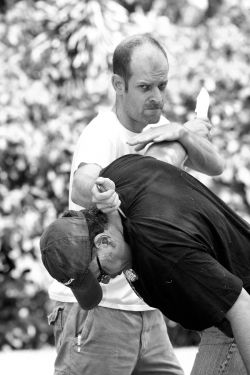
Anything else you'd like to add?
I truly believe in my product on a profound level. I see it as learning a life skill like first aid, swimming or defensive driving. It is for everyone - men, women, adolescents, seniors - as it's everyone's responsibility to care for their own personal safety. We too often rely on laws (drawn out, loopholes,expensive lawyers), police (overworked, own protocol) and alarms (slow response times, varied levels of efficiency depending on company) and, to me, it starts at home. We are our first line of defence and it starts with simple awareness and common sense, which so many people seem to have lost somewhere. As stated, I also believe there is a huge untapped demographic out there for what I teach that isn't interested in solely fighting, nor going through a multi-year process. Society is fast-paced and in the west we have short attention spans and want something that pays off immediately. I want this demographic and aim my curriculum at it. Thus the "Civilian" in the name as so many claim to teach military, law enforcement, security personnel - I want the civilian, the average Joe or Josephine that works 9-5, has a great attitude towards learning and a minimum of time.
I can be found at:
Website: www.mandirigmafma.com
Blog: www.mandirigmafma2011.tumblr.com
Youtube Channel: Mandirigma Arnis
Facebook: Mandirigma Arnis & Mandirigma Filipino Martial Arts Academy
Twitter: Mandirigma Arnis
Linked In: Darren Friesen
Radio Interview
Darren has been interviewed by Overseas Radio Network. You can listen to him here; the interview begins at about the 21 minute mark.
Thank you, Darren!
I really appreciate all the time and thought you gave to this interview!
Has your opinion changed?
Now that you've read this interview, has your opinion from the earlier poll changed?
Martial arts and self defense.
Do you think learning martial arts and self defense is important? Feel free to explain your answer.


